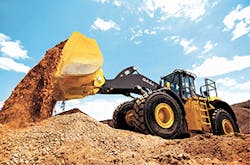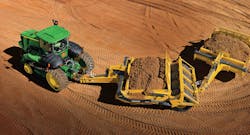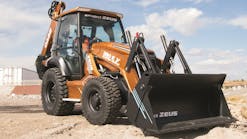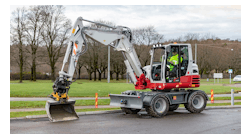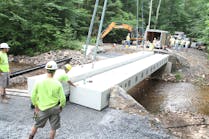Prior to coming to Southside Virginia Community College at Ft. Pickett in Blackstone, VA, as head of its heavy-equipment operator training program, Michael Jones had accumulated extensive experience as a construction equipment operator. Since his youth, he has had a fascination with working outside and being able to dig and mold the earth.
“I get great satisfaction in taking raw ground and building something out of it. After a project has been completed, I get a good feeling when reflecting that I helped build it. Most of the time, being a construction equipment operator is fun; the people in the construction business are interesting and good to work with. Only rarely have I gotten bored with my work. And the thrill of operating construction equipment has never worn off. An excavator is an extension of your arm, hand, and fingers, with your power greatly magnified, able to reach out and pick up tons of earth at a time.”
Is being a heavy-equipment operator an exciting and lucrative career? A lifetime of experience has convinced Jones that indeed it is. That the work is very interesting is evidenced by the countless “sidewalk superintendents” at any construction site. An operator gets to work outside. He can move anywhere in the country and find work. Finally, the pay is good.
Virginia is a right-to-work state, so there are few unions there and most contractors hire nonunion workers. According to Jones, nonunion wages (not including fringe benefits) range from $10/hr. in rural areas of Virginia to $18/hr. in urban areas.
Are there any disadvantages to being a heavy-equipment operator? One possible minus: adverse health effects. Bulldozer operators, Jones observes, frequently develop back problems–a result of bouncing around and receiving jolts while going over stumps when clearing land. And 40-45% of scraper operators, he says, have kidney problems, a result of all the sudden stops and starts and bouncing up and down.
Yet Jones believes such physical problems are not inevitable. With knowledge and better technique, he maintains, these problems can be avoided. With proper job planning and better technique, one can operate construction equipment much more gently with these results:
- No decrease in productivity
- Reduced wear and tear on construction equipment
- Reduced need for repairs
- Improved fuel economy
- Minimization of any adverse health effects to operators
“If you treat the machine well,” Jones says, “it will treat you well. There is no reason why a construction equipment operator should ever develop medical problems–if he uses proper construction equipment technique.”
Another disadvantage of being a construction equipment operator is that you are at the mercy of the weather. In mild Virginia, most heavy-equipment operators work year-round, but in northern states, cold weather might mean that workers sit idle in winter months.